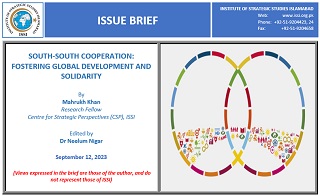In an interconnected world marked by unprecedented challenges and inequalities, South-South cooperation has emerged as a pivotal mechanism for advancing global development and promoting solidarity among nations. This form of collaboration, primarily among countries in the developing world, has gained prominence for its potential to address a wide array of issues, from climate change and healthcare crises to economic development and poverty reduction. This essay explores the significance and impact of South-South cooperation in today’s world.
In recognition of the significance of South-South cooperation and commemoration of the day in 1978 when the United Nations Conference on Technical Cooperation among Developing Countries adopted the Buenos Aires Plan of Action for Advancing and Executing Technical Cooperation among Developing Nations (A/C.2/66/L.48), the General Assembly designated September 12 as the United Nations Day for South-South Cooperation. The theme of the 2023 United Nations Day will be “Solidarity, Equity and Partnership: Unlocking South-South Cooperation to Achieve the SDGs,” to highlight needs emerging from various regions; as well as to present transformational initiatives by Member States, the UN System, private sector, and civil society toward addressing the most acute priorities in achievement of the 2030 Agenda.[1]
















